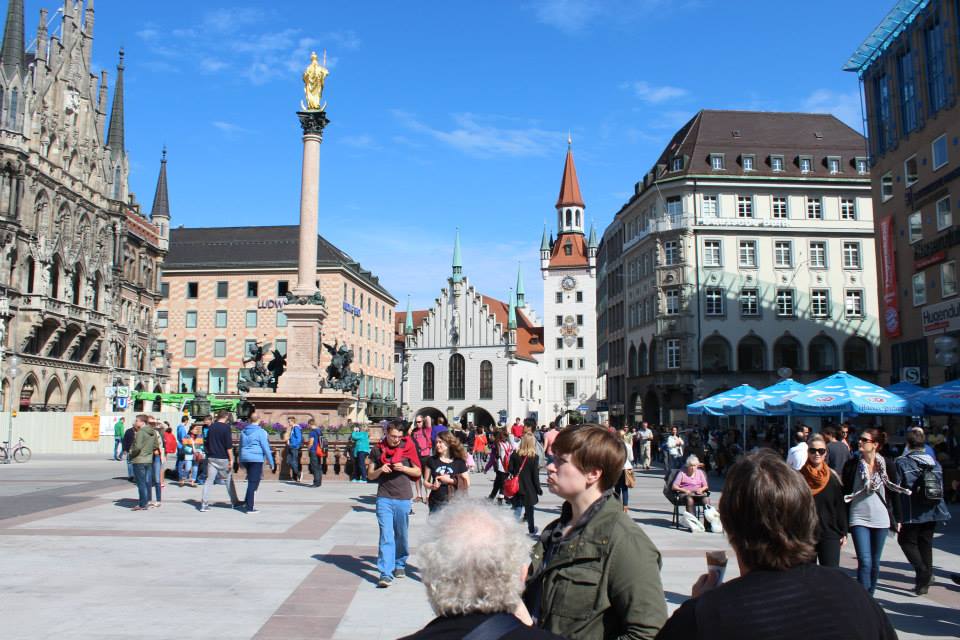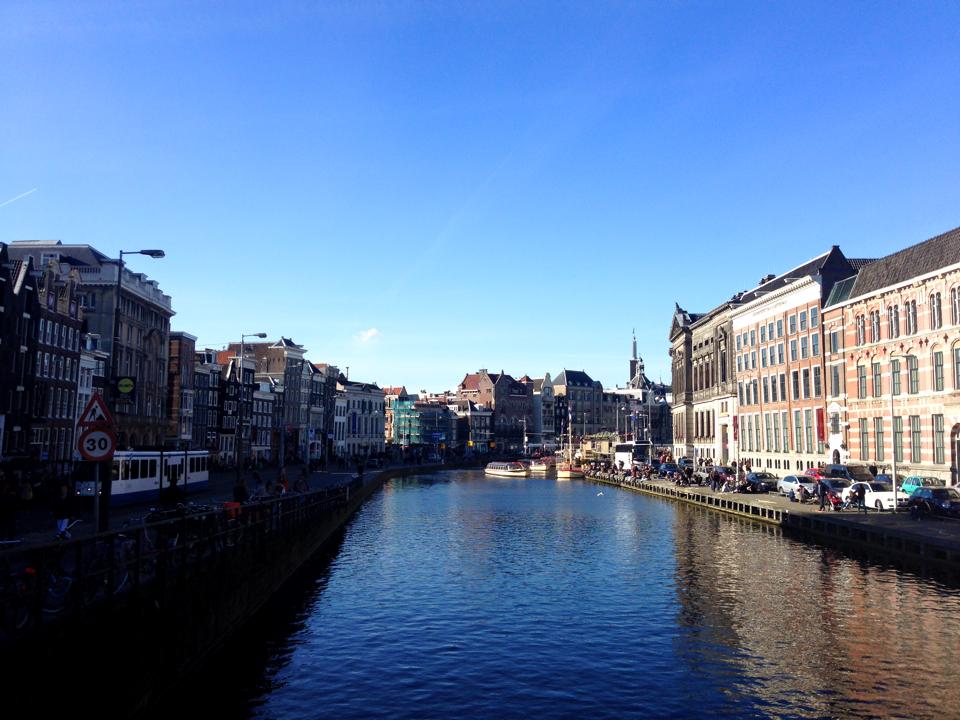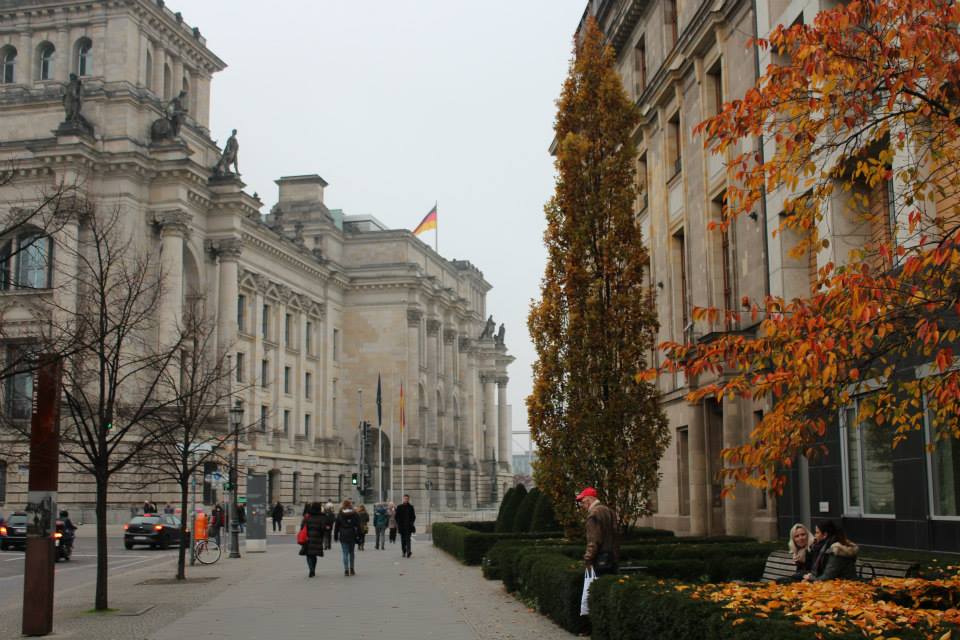What do you study at King’s?
German BA
Where did you teach as an ELA?
Porta Westfalica, North Rheine-Westphalia
Why did you choose the ELA Scheme?
For me personally, the decision to study abroad or teach English as an English Language Assistant was not difficult at all; I wanted a refreshing break from studying. After two years of study at King’s, and knowing that I would have to come back for fourth year, the decision was pretty easy! I also wanted to gain some valuable work experience for the future. I was swayed by the fact that the ELA is basically a paid work placement, working minimal hours a week (I worked 12); which meant that I would have a lot of time to travel. This sounds strange, but I was not very confident in front of large groups before my year abroad, and I wanted to also challenge myself to see if I could develop self-confidence. I have never wanted to be a teacher, (even though I am asked that question A LOT!) but why not do something that gives you an experience that you wouldn’t normally be able to do?

How do you prepare for teaching before the placement starts?
At the beginning, I was so nervous about standing in front of a class and teaching English – I had no idea what to do or what to expect. Luckily, the British Council organise a three-day induction course for ELAs in Germany in Cologne every year, which was so important in preparing for teaching. All of the ELA’s who would be teaching across Germany were at the induction too, so we were able to make new friends before teaching started. We were also able to meet other students from across the world – New Zealand, Australia and Canada. I was fortunate to have met some of my best friends during that induction; myself and the other ELA’s who were teaching in my area became close all year and now we are friends for life.
Additionally the first two weeks at school for ELA’s are normally called in German the Hospitation period, which is the observation period. I was very grateful for this, as you don’t go into teaching straight away; you watch lessons taken by the teachers so you can observe the teaching style, how the students behave, and what materials are used and so on. But by the end of the second week you will be itching to get started!
Describe your teaching and learning experience.
Working in a school in Germany was an amazing experience. I worked in a Gymnasium which is a secondary school equivalent of a grammar school in England. I taught students from Year 5 to Q2 (upper sixth form), so their ages varied from as young as 9 up to 18, which was a great variety!
The first few weeks are a little daunting, and I can guarantee that you will feel tired almost all of the time – suddenly you remember that you have to speak German all of the time (except in the English classroom), you’re constantly meeting new people, and you’re out and about exploring.
One great thing is that you will be assigned a teacher in the school who will be your ‘mentor teacher’ – this is usually an English teacher who acts as the head of the department. They will make sure that you have a place to live when you arrive, they will offer help with administration and paperwork and things like opening a bank account, they will make sure that everything is OK once you start at school, and if you ever have general problems they will be your first port of call. I found this support system to be one of the most important and helpful things for the year abroad experience.
I mainly taught alongside the main teacher in the class – offering support to students, checking their classwork and homework, and offering group or one-to-one reading work, especially for the lower years. Being a native speaker of English was such a benefit for the teacher, you are able to offer insights of living in the UK, British culture, and they will often ask you to offer a more ‘English way’ of saying something, which is always fun! After a few months I was often asked to take lessons on my own, especially if the teacher was planning to be away for a class. At first this can be a scary thought, but over time and once the students get used to you, you gain a lot more confidence, and wonder why you were ever worried in the first place.
The feeling of pride that you get when your students have improved their English skills or even knowledge about British culture is amazing and second to none. The students at my school showed a genuine interest to learn English and an even bigger interest in me as a person who really comes from England! For many students, I was the first British person that they had come into contact with, so I felt very responsible for their experiences with learning English and having fun with it too. I set up my own English Club as there was not already one at the school, and it made me so happy when the students threw themselves into the cultural and fun activities that I had organised for them.
Learning experience
A lot of people think that by teaching English, your language skills aren’t improved as much as if you study at a university. I found this quite the opposite, in fact, you need to have your German skills constantly in gear and ready to go, especially when the main question you are asked in the classroom (in German) is ‘what is this word/sentence in English?!’ So in fact you need very good translation skills! And contrary to popular belief, not everybody in Germany speaks English! I spoke German in the staff room at all times, even with the teachers in the English department. Getting your head around the German education system and the way the staff room and timetable works also teaches you new vocabulary and develops your cultural knowledge. Of course, you also use and develop your language skills by just experiencing day-to-day life in Germany, such as getting around on public transport, talking to shop assistants, finding a flat – you begin to feel extremely grown up all of a sudden…
Describe your living experience
My living experience was definitely one of the trickier situations during my time abroad, but looking back now I was extremely lucky. It is definitely a scary thing deciding where to live before you even arrive in Germany, so one of the colleagues at my school offered for me to stay with her for a couple of weeks so that I could actually see some flats in person, which was so helpful! She came with me to the viewings to help with technical language and to make sure I wasn’t being conned, so I would definitely recommend that you take your mentor teacher, colleague or a native speaker with you when looking at flats.
As my school was placed in a very small and rural town, and I had no previous experience or knowledge about the area I was going to be living in, I naturally decided to live close to the school so that I was not travelling for hours on end every day. I found a flat which was close to the school and at the time, that was the most important thing for me. Over time, my priorities changed, as I began to see a lot more of my ELA friends who lived in the nearest city to me, Bielefeld. The town that I lived in was very rural, so trains and buses stopped running at around 7-9pm, which meant that if I was out with my friends in the city, I had to come home early or stay with one of them, which I did for a long time. After a while, I personally found that living alone and in a secluded town was making me feel down, and that I could not enjoy my year abroad experience to the full. It took a while for me to decide whether to move to the city and travel for around an hour there and back to school, but eventually I decided that it was more important for my general well-being to be in a city surrounded by people than feeling constantly alone and down. Also, travel opportunities were a lot better when living in the city, so it meant I see many more places in my free time.
After a few months of searching, I found the perfect student flat in Bielefeld (a Wohnheimgemeinschaft or a WG for short – a shared flat) right next to the train station, which was great because I travelled by train to school every day! I had one flatmate who was German, so not only did I have company, but I could also improve my language skills. I could see my friends whenever I wanted, and I met so many more people my age, as it is also a university city, and there were so many things to do! I felt so much happier when I moved to the city – but not everyone would feel that this is the best choice for them. I would recommend that you find a place to live that is right for you, and not a place where you think you it would be best for everyone else. If you like the city – go for a city. Travelling in Germany is so easy; literally every small town is connected with a city, so it won’t be a problem! If you like the sound of being secluded, then go for that too, rural Germany is absolutely beautiful. If you like being surrounded by people – Germany is very well-known for its flat-sharing opportunities, you could share a flat with up to eight people if you really wanted!
Accommodation recommendations for Germany
My website recommendation for finding a flat in Germany is definitely WG Gesucht – www.wggesucht.de. This is a great platform where you can search for the perfect flat across the whole of Germany using the criteria that you need. For example, if you want an all-girl flat, sharing with 3 people, and you want to be in Munich’s city centre, you can put all of this information in and the results will show you a perfect or near-perfect match. The best thing about this website is that you don’t deal with letting or landlord companies, these are all people (and a lot of students) who maybe have a room spare in their flat already or they want to sublet their room. In Germany, subletting is extremely common, (Zwischenmiete), where students sublet their room for a certain amount of time. This can be perfect for a study abroad student, as you can either be there for as little as 3 months, or as long as 9+, and these are normally the periods of which subletting is most common. Additionally, when a person sublets you their room, they will normally leave all of their furniture and other equipment in the flat for you to use (which was my case when I moved to Bielefeld), which saves you having to buy all of it yourself. If you’re finding it hard to understand the technical language on the site, the website can be set into English, which is extremely helpful. The way you show your interest in renting a room from someone is sending them a message through the website or contact via email/phone where you can discuss your interest further and set up a viewing. I would recommend starting your accommodation search as early as possible –even when you are still in the UK. Do some research about the area you’ll be living in, and where you would be most comfortable. You can set up Skype meetings to view your room or get to know your flatmates before you get to Germany! Or, like I did, try to see if you can stay with a colleague first and have some room viewings scheduled for when you arrive.
Try and avoid other websites that have an ‘eBay’ feel to it – I once tried ‘eBay Kleinanzeigen’ where you can see flats that are available to rent. However the people who put their rooms up for rent on this website can be quite dodgy, so always try to use a website that is widely used by the natives themselves or ones that they recommend.
Describe the weekend and evening activities on offer
I’m not sure where to start with this one; the opportunities to do things in Germany are endless! There are so many cheap activities on offer for students. Firstly, make sure that you enrol at a university if you are going to be working in a school – you don’t have to take any classes at all, but you get the benefit of a student status at a German university. But if you want to take classes, especially language courses, then of course that is a great opportunity to fill up your evenings and weekends, and you further improve your language skills.
I never took a class at the university (they were all full) but I could receive the Semesterticket, which is a train/bus/tram pass. You pay around €250 for a term, and receive a pass which allows you to travel in your Bundesland or state for absolutely free, which meant that the whole of North Rheine-Westphalia was at my disposal! So of course, travelling at the weekends or on days off is a brilliant activity, and if it is free, then it is essential! I was able to see places like Cologne, Düsseldorf, Essen, and Dortmund etc. for free on trains. Additionally, you can get student discounts if you want to travel outside of your state or even the country. I managed to get to Amsterdam and back on a high-speed train for less than €60. Don’t forget websites such as www.meinfernbus.de/flickbus.de where you can get a coach to anywhere in Germany or even abroad for around €10. I got to Munich (which is 10 hours away from Bielefeld) on a coach for €5… and it was a very nice coach!
There were endless opportunities to eat out for a good price in Bielefeld, and I know in Germany in general. Vapiano will be your favourite restaurant in Germany for sure! It is a German chain of Italian food restaurants (there is one in Oxford Circus but in Germany they are everywhere!) and you can get a whole meal for under €10. It is a great place to eat and socialise. Of course, drinking in Germany is actually also quite cheap, and the beer is amazing! Take the opportunity to go to big events such as Oktoberfest, and go to as many German Christmas markets too – they were my favourite things to do!
Germans are very big on their outdoor activities, so you will definitely find that you will do something outdoorsy at least once in the year! Sundays in Germany are normally a day spent together with family and friends, and no matter what the weather you will see people out in parks, on the streets, even swimming in lakes. I went climbing; I rode my bike and went running a lot more than I do in England! Outdoor activities are cheap in Germany too, which is great, and also things like theatres, cinemas and exhibitions at museums are very well priced for students.
If you find yourself in Bielefeld one day (or even living there!) I would recommend going to the Tierpark (the outdoor zoo, which is amazing because they have 2 brown bears!), the botanical gardens, the Sparrenberg castle located on top of a hill/mountain, which offers the best views for miles. Also, Bielefeld is the home of Dr. Oetker, a German food company that also supplies to the UK (think of pizza, cakes, yoghurt; but mostly pizza!) and you can visit the headquarters, which are located in Bielefeld! Random, I know, but a few times in a year they open all night to visitors, and you can get a whole load of pizza for free…
Top 10 Things about your Year Abroad/ELA experience
1. Salary – Even though it’s never all about the money (…), the ELA scheme is paid work experience, and it does pay really well for a student. In the years 2014-2015, for working as an ELA in Germany, I received €800 a month; in Austria it goes up to around €1,000. Including the fact that living costs in Germany and most European countries are generally much cheaper than the UK, you literally can save money during the year, and also have a lot of money left over for your travel experiences, which I found invaluable. You also still receive your maintenance loan, plus an Erasmus grant (this may change in 2016-2017) it really is a great thing, and not a lot of students know just how well it is paid.
2. Food – The food is definitely in the top 5 best things about my year abroad experience! No one really gives German/Austrian/Swiss food in the UK a second glance, but when you are there it is the best thing ever. You will definitely fall in love with the bread, the cheese, the meat (especially the many varieties of Wurst – Brat/Currywurst are my favourites!) the list could go on.
3. Travel! – With the money you receive, plus all of the spare time you will have, the opportunity to travel is one of the best things about being an ELA.Not only can you travel for low costs around Germany and the whole of Europe, but also the opportunity to go even further abroad is always there, because you will probably never get such a great opportunity again.
4. New friends – Meeting so many new people is also one of the greatest things about being an ELA. When I returned to the UK, I knew that I had expanded my friendship circle outside of just London and at home, you will find friends from all over the world. And when I go back to Germany, I know I will be able to meet and stay with my colleagues in Germany!
5. Improving the language and taking on a new culture – Not many people around the age of 20 will be able to say that they have spent a year in another country teaching English, and many of your non-language-studying friends will be insanely jealous. You will pick up new, every-day vocab before that you never thought you would need, like ‘ironing board’ or ‘bank transferal’ or something like that. During the year, you may not even be aware of the fact that every day you are improving your language and interpersonal skills, but when you return to the UK you will definitely notice how well rounded you have become.
6. The proud and happy feeling you get when you see how your assistant teaching has benefitted the students is one of the best things about being an ELA. At the end of the year, I received cards and presents from the students thanking me for helping them improve their English! Even though you are helping them in a small way, just your presence in the classroom will intrigue them and spur them on to learn.
7. Living and working abroad can help you make decisions for the future. Even though I don’t want to be a teacher, I know that I would love to go back to Germany and live there for a long time. If I decide to carry on my studies after undergraduate level, I know that I will be returning to Bielefeld University, as I have already created a life there which I feel comfortable returning to!
8. The German nightlife is really different from the UK (and sometimes a lot more crazy). Clubs and bars stay open until much later (or earlier, depends how you look at it); I found myself coming home at 6am a lot of the time! Of course you don’t have to do this (or you can stay out even later!) but the experience is really great, and the drinks are a lot cheaper than in London. German people also love socialising and getting together over a coffee / cake / beer / wine / Schnitzel, and I never ever found myself bored in their company! I loved this way of socialising which can be different in a great way than in the UK.
9. Accommodation opportunities are amazing in Germany, and like I have said, much cheaper than London. Flats and apartments in Germany are also so different- there is a huge variety of places that you can live. My first accommodation was the bottom floor of a whole house (so a lot of space for me!) at the foot of a beautiful forest. My second flat was in a flat suited for university students, it had a balcony and located in the middle of the city and near the train station. I found it much easier finding a flat in Germany than I did in London, especially one suited for students.
10. Employability potential – I definitely feel confident that my year abroad will be a great asset on my CV, as not only did I live abroad for a year, I also worked in a teaching position, which gives you an endless list of necessary skills. I already have had some interest from employers about what my role was on my year abroad, and I feel a lot more employable than I would if I had just studied at a university.

